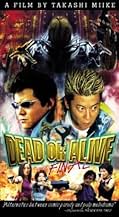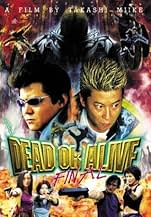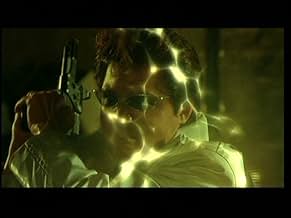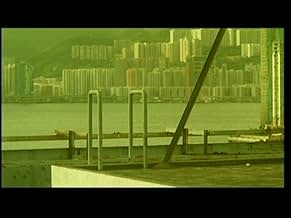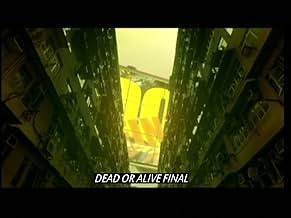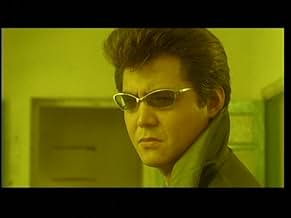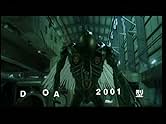IMDb-BEWERTUNG
5,6/10
2930
IHRE BEWERTUNG
Das Polizisten-Ass einer totalitären Polizei und ein driftender Androide spielen ihre Rolle in einer postapokalyptischen Gesellschaft. Sie sind dazu bestimmt zu kämpfen. Ihre Begegnung wird ... Alles lesenDas Polizisten-Ass einer totalitären Polizei und ein driftender Androide spielen ihre Rolle in einer postapokalyptischen Gesellschaft. Sie sind dazu bestimmt zu kämpfen. Ihre Begegnung wird sie für immer verändern.Das Polizisten-Ass einer totalitären Polizei und ein driftender Androide spielen ihre Rolle in einer postapokalyptischen Gesellschaft. Sie sind dazu bestimmt zu kämpfen. Ihre Begegnung wird sie für immer verändern.
- Regie
- Drehbuch
- Hauptbesetzung
William Wai-Lun Duen
- Gangster
- (as William Duan)
Wai-Kwong Lo
- Gangster
- (as Kenneth Low)
Don Thai Theerathada
- Don
- (as Donald Panutat)
Empfohlene Bewertungen
This was a surprise - I was expecting something along the lines of the original DOA, not having seen any of the sequels. What you actually get is a slowish, rather beautiful, enigmatic science fiction film, rather like a Philip K Dick novel in that its central themes are love and the problem of how to be human in a mechanical world.
The film borrows the notion of 'replicants' from Blade Runner (I can't remember if they were called that in PKD's source novel) but takes the idea further than that highly over-rated film, bringing us characters who don't realise that they're replicants battling replicants who are becoming human, ending with a strange metal-morphosis straight out of 'Tetsuo'. The story moves along smoothly but never really kicks into high gear. We're in 2346, in Yokohama, where the gay Mayor Wu has made the consumption of a birth control drug that destroys love a compulsory act. Babies born due to defiance of the law are destoyed, Herod-style. Riki Takeuchi (who is getting a bit porky these days!) is Wu's enforcer.
Puzzlingly, he has a small son. He goes into action against some revolutionaries and has all of his most cherished illusions destroyed...
Visually, the film is quite lovely, even though it seems to have been made (as per usual with Takashi) very speedily. It also seems to have been shot on some kind of video process, which doesn't hold up well on the big screen but won't bother anybody watching it at home.
The ending is unfathomable even by Takashi's standards, and rather abrupt. Still, there's nobody else like him...
The film borrows the notion of 'replicants' from Blade Runner (I can't remember if they were called that in PKD's source novel) but takes the idea further than that highly over-rated film, bringing us characters who don't realise that they're replicants battling replicants who are becoming human, ending with a strange metal-morphosis straight out of 'Tetsuo'. The story moves along smoothly but never really kicks into high gear. We're in 2346, in Yokohama, where the gay Mayor Wu has made the consumption of a birth control drug that destroys love a compulsory act. Babies born due to defiance of the law are destoyed, Herod-style. Riki Takeuchi (who is getting a bit porky these days!) is Wu's enforcer.
Puzzlingly, he has a small son. He goes into action against some revolutionaries and has all of his most cherished illusions destroyed...
Visually, the film is quite lovely, even though it seems to have been made (as per usual with Takashi) very speedily. It also seems to have been shot on some kind of video process, which doesn't hold up well on the big screen but won't bother anybody watching it at home.
The ending is unfathomable even by Takashi's standards, and rather abrupt. Still, there's nobody else like him...
In the last of a trilogy, Riki Takeuchi and Sho Aikawa are once again on the opposite ends of the spectrum, as they were in the first DOA, after being the best of friends in the second one. Riki is a cop searching for his son being held by a gang whom drifter Sho is a part of. Even though, if you think about it and put yourself in Miike's flow of logic, this ending film is inevitable in it's actions, it's still the less of the three. Of course no Takashi Miike film is totally without merit and such is the case here. There are a few setpeices that make it worthwhile, but the poetry I usually find in a Miike film is not found here (at least in the amounts that I usually expect from this director)
My Grade: C-
My Grade: C-
The final installment sees Sho Aikawa and Riki Takeuchi (looking cooler than ever in his reversible overcoat!) pitched against each other for one last battle, this time in the future. The plot owes a lot to Blade Runner, but done in Takashi Miike's low budget, frenetic, comic style. I did feel that it was the weakest of the three DOA films, and although the ending was still outrageous, it lacked the shock value of the previous two. Compared to the likes of Ichi the Killer and Visitor Q, DOA:Final is nowhere near as extreme, but is faithful to the other two films in the trilogy. That said, fans of the first two (and fans of Miike) will get a lot from this as it ties all three films together and gives a final explanation of the relationship between the two protagonists.
I guess it's for the best that this Dead or Alive is the final one, because it's not great. Though to be honest, I feel like this whole trilogy is one where only a single film is good. I didn't love the first one, dug the second, and then found this third one a bit tedious.
I thought it would have a little something going for it thanks to the sci-fi elements, but you forget it's set 300+ years in the future for the most part; it's really just a few establishing shots where it feels futuristic. Otherwise, Miike just slaps a yellow filter over all the outdoor scenes Breaking Bad-style and calls it a day.
The action is so-so. At least it's short. And I laughed a few times at the saxophone guy. If there's one reason to watch the movie, it's the saxophone guy. He doesn't have anything on the saxophone guy from The Lost Boys (who does, to be fair), but he's still amusing.
I thought it would have a little something going for it thanks to the sci-fi elements, but you forget it's set 300+ years in the future for the most part; it's really just a few establishing shots where it feels futuristic. Otherwise, Miike just slaps a yellow filter over all the outdoor scenes Breaking Bad-style and calls it a day.
The action is so-so. At least it's short. And I laughed a few times at the saxophone guy. If there's one reason to watch the movie, it's the saxophone guy. He doesn't have anything on the saxophone guy from The Lost Boys (who does, to be fair), but he's still amusing.
While Miike Takashi has not written any of the films he has directed, his style and formula (or lack thereof) has made him a force to be reckoned with in modern filmmaking. He takes the most mundane of stories and scenarios and gives it a fresh jolt of adrenaline and emotion, making his films seem as fresh and as original as anything by David Lynch or Stanley Kubrick. "Dead or Alive: Hanzaisha" was about a cop and a criminal struggling against each other and ultimately destroying both their families and themselves. "Dead or Alive 2: Tôbôsha" was about two hitmen rediscovering their innocence only to lose it again and ultimately destroy themselves. Now we have "Dead or Alive: Final," the third and final installment in a trilogy of films that are unrelated to each other...and yet they've all got something in common besides the director and the two main actors.
"Dead or Alive: Final" plunges us into Yokohama of 2346, where a homosexual mayor has outlawed human breeding and keep srigid control through use of birth control pills and his chief enforcer, Officer Honda (Takeuchi Riki). Standing in the mayor's way is a group of rebels, led by Fong (Terence Yin) and Jun (Josie Ho), who now have a new ally, a "replicant" by the name of Ryo (Aikawa Sho, still sporting his cool blond hair). Immediately, the "Blade Runner" references run rampant, right down to the terminology. The use of the word "replicant" to describe Ryo, the omnipresent floating blimp with the huge TV screens flashing advertisements, the decrepit rain-swept environment of a ravaged city, even the characters themselves, all homages to "Blade Runner." Oh but there are other sci-fi nods too. Elements of "THX-1138," "The Matrix," "The Terminator," etc...it's all there, making "Dead or Alive: Final" almost a satire (and sometimes a parody) of sci-fi cinema.
There's more than just the humorous nod to sci-fi going on. Yet again, Miike has given us a few thrills via his "Don't expect anything" style. While there is nothing truly shocking in this film compared to its predecessors (save for the ending), there is still the nod to Kitano's films (i.e. beautiful scenery, long shots of characters, and even a few beach scenes). But while Kitano is poetic, Miike is like a jackhammer, hitting you full-on in the face with his own brand of filmmaking. The story is nothing new, and even the characters are easily understood and familiar, but there is something about Miike's gritty take on the conventions of genres and cinema that gives it an originality. Who else but Miike could make three completely different and unrelated films and tie them all together into a package that is both confusing and cohesive? Okay, so the ending still threw me for a loop, but it was typical of Miike.
In the end, we are left with many of the same themes...the predominant one being that some people just never quit, and in the end it will destroy them. Honda's son is kidnapped, and even after he is returned, he is still hellbent on stopping the rebels. Ryo could easily back out of the fight and go on with his life, but he can't. The evil dictator could easily allow people to live their lives as they see fit, but he refuses to relent. Even a scene where a rebel is given the choice to either die or take the birth control drug, he decides to die for a cause that is pretty much lost. In all three "Dead or Alive" movies, nobody quits...and as a result everybody dies. The people who do know when to back down are the ones who survive. Ryo and Honda can't quit...and in the end, they meet for their final showdown, which resonates their endings in the previous two films. The tie in is not as neat as it could have been, but again, it's typical of Miike to give us something we really would not have expected, and at the same time that it's shocking, it makes a strange kind of sense. "Dead or Alive: Final" ties in all three movies, but not in the way that you might think. It yet again presents the same themes but from a completely different angle. It's like telling the same story...but not the same story. The idea is the same, but the details are different. There is the essence of the "Dead or Alive" films, and is probably the essence of Miike's films. They're nothing new...and yet, they are. It's not for everybody, but it's certainly different.
"Dead or Alive: Final" plunges us into Yokohama of 2346, where a homosexual mayor has outlawed human breeding and keep srigid control through use of birth control pills and his chief enforcer, Officer Honda (Takeuchi Riki). Standing in the mayor's way is a group of rebels, led by Fong (Terence Yin) and Jun (Josie Ho), who now have a new ally, a "replicant" by the name of Ryo (Aikawa Sho, still sporting his cool blond hair). Immediately, the "Blade Runner" references run rampant, right down to the terminology. The use of the word "replicant" to describe Ryo, the omnipresent floating blimp with the huge TV screens flashing advertisements, the decrepit rain-swept environment of a ravaged city, even the characters themselves, all homages to "Blade Runner." Oh but there are other sci-fi nods too. Elements of "THX-1138," "The Matrix," "The Terminator," etc...it's all there, making "Dead or Alive: Final" almost a satire (and sometimes a parody) of sci-fi cinema.
There's more than just the humorous nod to sci-fi going on. Yet again, Miike has given us a few thrills via his "Don't expect anything" style. While there is nothing truly shocking in this film compared to its predecessors (save for the ending), there is still the nod to Kitano's films (i.e. beautiful scenery, long shots of characters, and even a few beach scenes). But while Kitano is poetic, Miike is like a jackhammer, hitting you full-on in the face with his own brand of filmmaking. The story is nothing new, and even the characters are easily understood and familiar, but there is something about Miike's gritty take on the conventions of genres and cinema that gives it an originality. Who else but Miike could make three completely different and unrelated films and tie them all together into a package that is both confusing and cohesive? Okay, so the ending still threw me for a loop, but it was typical of Miike.
In the end, we are left with many of the same themes...the predominant one being that some people just never quit, and in the end it will destroy them. Honda's son is kidnapped, and even after he is returned, he is still hellbent on stopping the rebels. Ryo could easily back out of the fight and go on with his life, but he can't. The evil dictator could easily allow people to live their lives as they see fit, but he refuses to relent. Even a scene where a rebel is given the choice to either die or take the birth control drug, he decides to die for a cause that is pretty much lost. In all three "Dead or Alive" movies, nobody quits...and as a result everybody dies. The people who do know when to back down are the ones who survive. Ryo and Honda can't quit...and in the end, they meet for their final showdown, which resonates their endings in the previous two films. The tie in is not as neat as it could have been, but again, it's typical of Miike to give us something we really would not have expected, and at the same time that it's shocking, it makes a strange kind of sense. "Dead or Alive: Final" ties in all three movies, but not in the way that you might think. It yet again presents the same themes but from a completely different angle. It's like telling the same story...but not the same story. The idea is the same, but the details are different. There is the essence of the "Dead or Alive" films, and is probably the essence of Miike's films. They're nothing new...and yet, they are. It's not for everybody, but it's certainly different.
Wusstest du schon
- VerbindungenEdited from Dead or Alive (1999)
Top-Auswahl
Melde dich zum Bewerten an und greife auf die Watchlist für personalisierte Empfehlungen zu.
Details
- Erscheinungsdatum
- Herkunftsland
- Offizieller Standort
- Sprachen
- Auch bekannt als
- Dead or Alive 3: Duelo final
- Drehorte
- Produktionsfirmen
- Weitere beteiligte Unternehmen bei IMDbPro anzeigen
Box Office
- Bruttoertrag in den USA und Kanada
- 2.591 $
- Eröffnungswochenende in den USA und in Kanada
- 1.841 $
- 1. Dez. 2002
- Weltweiter Bruttoertrag
- 2.591 $
Zu dieser Seite beitragen
Bearbeitung vorschlagen oder fehlenden Inhalt hinzufügen

Oberste Lücke
By what name was Dead or Alive: Final (2002) officially released in Canada in English?
Antwort

